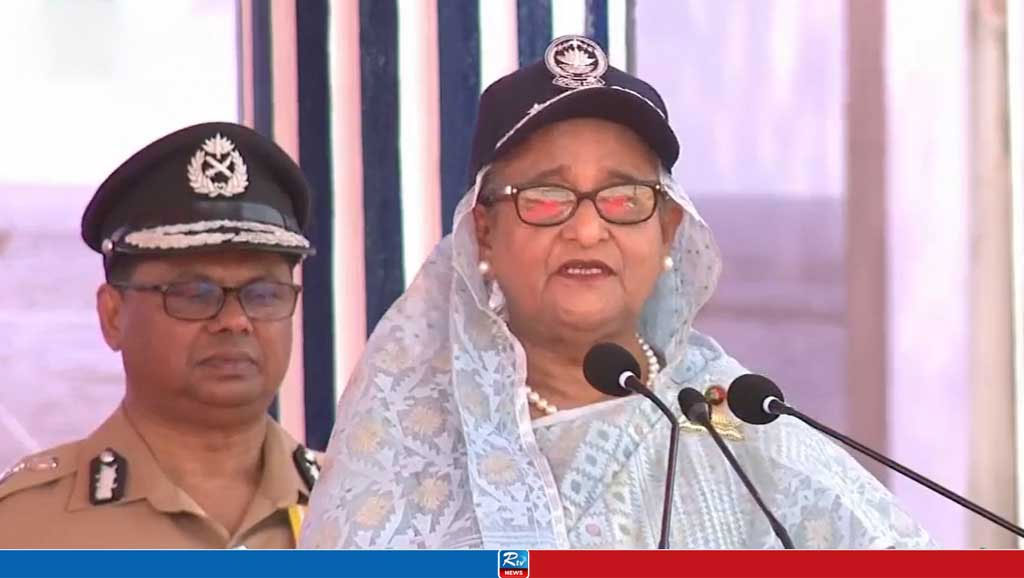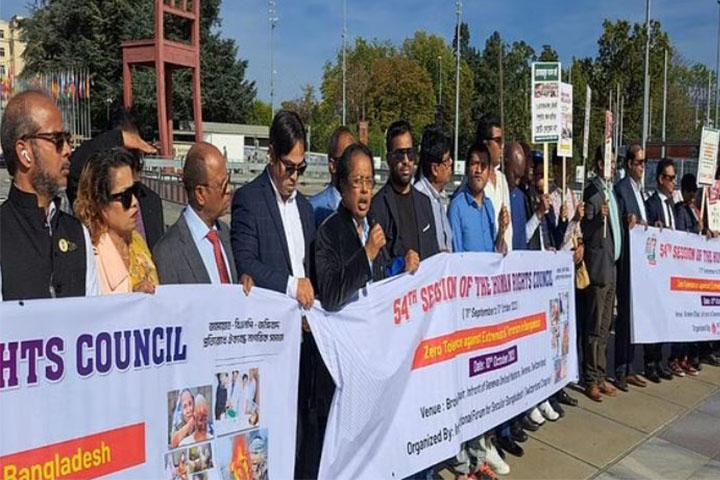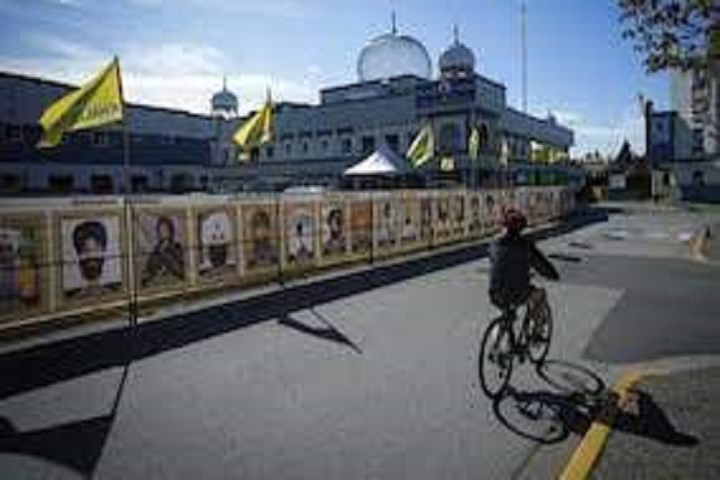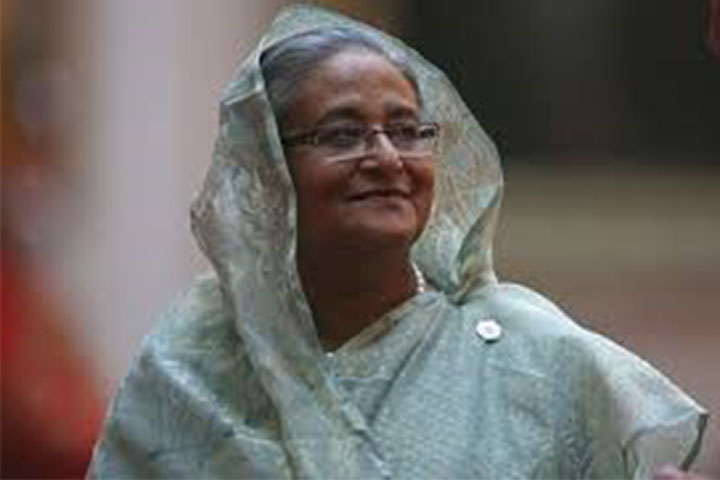'Violence and terrorism emanates from intolerance, disrespect towards others'
On Wednesday, Foreign Minister Dr AK Abdul Momen said, I am delighted to join you all in this seminar on “Buddhism & Buddhist Circuit Development between Bangladesh & India”.
My sincere thanks to the organizers for this initiatve and inviting me. The topic is of immense cultural and historical significance for Bangladesh and India and in the region.
At the outset, in this fateful month of August, I humbly recall with deep respect our Father of the Nation Bangabandhu Sheikh MujiburRahman- the gretest Bengali of all time and I also remember with deep respect our ShaheedBangamata, the family members of bangabandhu and all the martyrs who were brutally killed in the fateful night of August 15, 1975.
Mr. Momen said, "It is our constitutional commitment to ensure secularism as it is mentioned in the preamble as one of the fundamental principles of Bangladesh. Article 8 enshrines secularism as one of the fundamental principles of state policy. Article 12 elaborates further on secularism and freedom of religion.
This inclusive provision in the constitution establishes a harmonious relationship between the state and all religions, including Buddhism. Such provision has entrusted us with the responsibility for the preservation and promotion of all religious heritage including the Buddhist heritage, further promoting the interfaith harmony and understanding in our nation.
In Bangladesh, Muslims, Hindus, Buddhists, and Christians - the people from all the religions exhibit love, empathy, mutual respect, and support for eachother. Their deep affection for the country is evident, as they collectively fought during the war of liberation in 1971 and achieved independence.
Following the legacy of the Father of the Nation Bangabandhu Sheikh Mujibur Rahman, his able daughter Hon’ble Prime Minister Sheikh Hasina is pursuing the principle of secularism to the fullest extent. Her famous slogan,"Religion is for individuals, while festivals for all" is seen as the “mantra” for peaceful co-existence of all religions in Bangladesh, which is really appreciated all over the world, especially in our neighboring countries.
In Bangladesh people from all religions are peacefully living and promoting their culture and heritage, all religions are equally treated in Bangladesh. We don’t discriminate."
AK Momen also said, "Buddhism is the world’s fourth largest religion with over 520 million followers, or over 7% of the global population. Buddhism holds a variety of traditions, beliefs, and spiritual practices largely based on original teachings attributed to the Buddha and his philosophies.
There are about 1 million Buddhists living in Bangladesh. They form about 0.6% of total population of Bangladesh. Over 65% of the Buddhist population is concentrated in the Chattogram Hill Tracts region. Like the Buddhists around the world, the Buddhists in Bangladesh are peace loving people. Although the size of the Buddhist population is not significant; Buddhist culture and heritage have played a significant role in our national stature.
To ensure religious freedom and coexistence to establish peace in the Chittagong Hill Tracts, Chittagong Hill Tracts peace Accord was signed in 1997. Recently government has appointed Ambassador SupradipChakma as the Chairman of the Hill Tracts Development Board.
Buddhism is a religion of peace. Lord Buddha was a great master of humanity. He tied to rescue human being from sufferings. He was born as a human being, lived as a human being, achieved Nirvana as a human being and thus exalted the dignity of a human being. He promoted ‘Ohingsho’ – non-violence and it is time for its followers to adhere to his teachings of non-violence."
Foreign Minister Momen added, "Buddhism has a deep-rooted heritage and a significant cultural circuit in the South Asian region. South Asia is recognized as the Heartland of Buddhism.
India and Bangladesh have a history of friendly relations, deeply rooted in shared culture and heritage. Buddhism, being an integral part of both our cultures, opens up avenues for mutual engagement. I strongly believe that Buddhist Circuit Development between the Buddhists of Bangladesh and India may deepen the people-to-people contact and bondage between the two countries.
Bangladesh is the birthplace of the great Buddhist scholar AtishDipankar who went to Tibet and propagated Buddhism there for which the people of Tibet still pay respect to him.
Bangladesh, once known as the ancient kingdom of Pundravardhana, hosts a number of Buddhist archaeological sites and monuments.
From the ancient monastic establishments in Mahasthangarh to the revered Mahabodhi Temple in Paharpur, these sacred sites stand as a testament to the profound impact Buddhism had on this region. As we take pride in our cultural diversity, the recognition of this Buddhist heritage becomes an integral part of our identity.
India, on the other hand, is also renowned for its rich Buddhist heritage, which dates back more than two millennia. Buddhism originated in India over two and a half millennia ago, when Siddhartha Gautama, the Buddha, attained enlightenment in Bodh Gaya. Since then, the teachings of Buddhism have spread across the region and beyond, leaving an indelible mark on the cultural landscape. The birthplace of Buddhism, India hosts a lot of sacred sites and monuments that form the revered Buddhist circuit.
Buddhist cultural links between Bangladesh and India may act as a catalyst for further enhancing friendship and understanding, particularly in the area of people-to-people contact. As pilgrims travel between our nations, they forge connections and create lifelong memories that transcend borders. These interactions contribute to the promotion of secularism by fostering respect and appreciation for diverse beliefs and traditions."
He underscored 5 specific proposals for further engagement in this area:
We need to use Buddhism and its heritage as a tool for “bonding friendship” among the countries. To this effect, the conservation, development, and promotion of these heritages remain crucial. This is crucial not only for spiritual followers but also for those interested in exploring the rich history and cultural diversity of the South Asian region.
While we may continue to work bilaterally, we also need to follow a regional-level approach within South Asia and expand it to Southeast Asia to unleash the potential of the region’s Buddhist heritage for inclusive development.
We need to strengthen activities within regional organizations like SAARC and BIMSTEC to explore ways and means to conserve and promote cultural diversity in the region, especially promoting the Buddhist circuit. Establishing a good Buddhist circuit can play a catalytic role in this regard.
We need to foster a united effort in order to ensure sustainable tourism development to complement the overall sustainable development of the region.
Organize regular regional forums and conferences on cultural heritage and tourism development in South Asia to share experiences, best practices, and challenges related to preserving and promoting Buddhist heritage. Think-tank and various religious organizations can play their due role. "
Foreign Minister Momen appreciates this initiative of Dharmarajika to arrange this event and said, "Lord Buddha was a torchbearer of peace and humanity. Father of the Nation Bangabandhu Sheikh MujiburRahman in his historic UNGA speech in 1974 underscored the importance of Peace for the survival of mankind. In his pursuit of world peace and human rights, Bangabandhu Sheikh Mujib was awarded the Joliot-Curie Medal of Peace on 23 May 1973. Bangabandhu always believed that peace is imperative for development.
Following Bangabandhu’s philosophy, Bangladesh became an ardent advocate for world peace.
His able daughter Prime Minister Sheikh Hasina is also working relentlessly for peace and proposperity for all. She promoted an UN resolution titled Culture of Peace. It believes that all violence, terrorism and war emanates for a mindset of intolerance, a mindset of disrespect towards others. Therefore, if we can inculcate a mindset of respect, a mindset of tolerance towards other irrespective of religion, ethnicity, color and race, we can hope to have sustainable peace across nations. Let us work together to achieve such goal.
In fact, for ensuring prosperity in the region, we need peaceful co-existence of all nations and all countries. Buddhist circuit development can play a vital role in this regard. The teaching of Lord Buddha could be a good basis for a peaceful society and peaceful region."
02 Aug 2023,16:28
















 Live Tv
Live Tv









